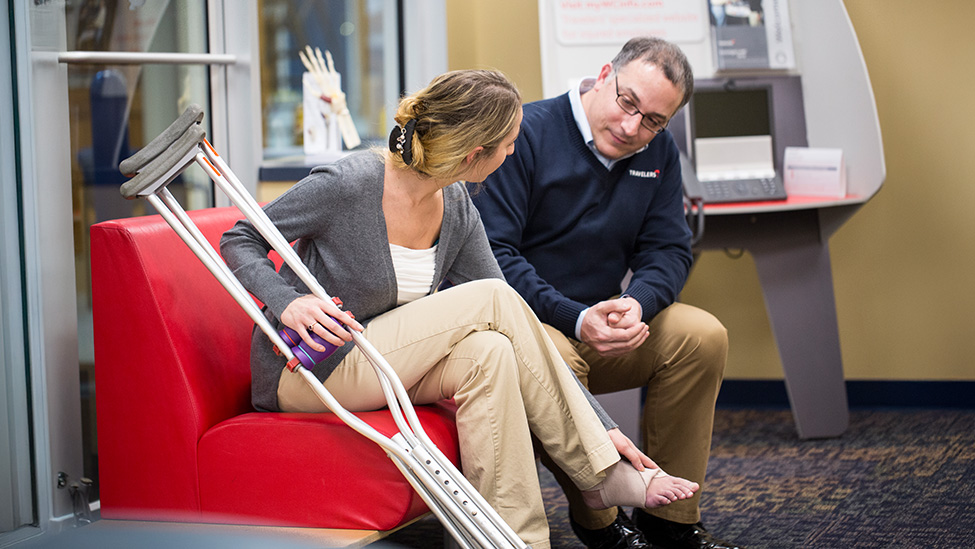Safety & Health: Preventing Chronic Pain & Potential Opioid Use
The impact of opioid addiction is a complex and pressing issue that poses significant challenges for the workforce and economy. The Centers for Disease Control and Prevention (CDC) reports that more than 68,000 people died in 2023 from drug overdoses and that opioids played a role in more than 81% of those deaths. Additionally, the CDC reports that with respect to almost two-thirds of overdose deaths, there was at least one opportunity for intervention, highlighting the importance of early recognition and involvement.1
At Travelers, we invest in programs designed to help prevent chronic pain and potential opioid use among injured employees. In addition to helping injured employees, these programs help reduce Travelers’ opioid-related claim costs, illustrating the shared value we create for our customers, their employees, our communities and our shareholders. Some of our programs are described below.
Using our data and analytics to help reduce addiction
By analyzing workers compensation claim data, Travelers created the Early Severity Predictor® model, which can help identify an injured employee’s likelihood of experiencing chronic pain by using weighted predictors at key points during the life of a claim. By adjusting medical care and resources, the Early Severity Predictor model can help address potential drivers of chronic pain – a condition that is largely treated with opioids or other painkillers – and reduce the risk of opioid addiction.
We have reviewed the claims of more than 120,000 injured employees through this program since its inception in 2015. In addition to improving the recovery experience for tens of thousands of injured employees, the program has contributed to a cumulative reduction of approximately $245 million in opioid-related claim costs. We apply this model to all of the lost-time workers compensation claims we receive.
Opioid addiction and the construction industry
Construction sites present health and safety risks that can lead to worker injuries, such as strains, sprains, broken bones and head traumas, which can result in chronic pain and opioid treatment. Many workers compensation claims submitted to Travelers from the construction industry involve opioid prescriptions. To help curb prescription opioid abuse, we use our Early Severity Predictor alongside our comprehensive pharmacy management program, which monitors drug interactions, excessive dosing and abuse patterns to reduce the risk of opioid dependency. With these two efforts combined, we have seen a nearly 50% reduction in the use of opioids among the injured construction workers we have helped since 2014.
Furthermore, our nurses and Claim professionals create specific action plans for injuries that often include physical therapy and other interventions to prevent acute pain from becoming chronic. This approach is particularly important for the construction industry, where Travelers claim data show that injured employees who suffer from chronic pain can be out of work for significantly longer periods of time than those in other industries.
Learn more about one of the workers compensation-related risks and challenges addressed by our medical team in a white paper, which aims to assist with suicide prevention in the construction industry.
To read more about how we help prevent chronic pain and potential opioid use for our customers and their employees, please visit the Employee Wellness page of our corporate website.
1 CDC’s State Unintentional Drug Overdose Reporting System (SUDORS), data updated December 2024.
More about safety & health
Approach
As an employer, we’re committed to the safety, health and well-being of our employees – our most valuable asset. And as an insurer, we are in the business of improving the safety, health and well-being of our customers and our communities.
Safety awareness & culture
Travelers Workforce Advantage® is our comprehensive approach to helping our Business Insurance customers manage employee safety.
Industrial Hygiene Laboratory
Our Industrial Hygiene Laboratory, located within our Claim University campus in Connecticut, provides specialized services to our business customers to help them assess employee exposures to potentially harmful environments and work toward the prevention of occupational illnesses.
Ergonomics consulting services
Our ergonomics specialists focus on helping customers identify and reduce ergonomic risk factors in the workplace.
Transportation safety
Travelers Risk Control transportation specialists help customers understand auto risk while providing effective fleet risk management solutions to businesses with commercial auto fleets.
Fire & life safety
Travelers Risk Control fire protection specialists and consultants evaluate fire hazards and protection systems, helping customers protect property, life and business.
Enhancing the experience of injured employees
Travelers takes a biopsychosocial approach to employee recovery, identifying and addressing the many factors that may impact recovery after an injury or illness.
Illustrative initiatives
Travelers Medical Capabilities
ConciergeCLAIM® Nurse: Helping Injured Employees Return to Work

Travelers Medical Capabilities
MyTravelers®: Secure and Convenient Access from Anywhere

Travelers Institute®
Forces at WorkSM Initiative
